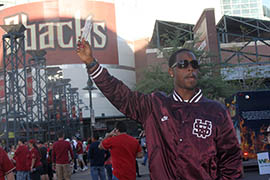- Slug: BC-CNS-Ticket Scalping, 1st Ld-Writethru,685
- Note: A previous version of this story erroneously characterized the terms of a state law limiting resale of tickets within 200 feet of a venue’s entrance or connected parking lot. The law stating that limit applies only to the sale of tickets at more than face value.
- Photo available (thumbnail, caption below)
By JOE MARTIN
Cronkite News Service
PHOENIX – Standing in the shadow of Chase Field on a rainy afternoon, Jery Brown is looking for customers among those heading to see the Arizona Diamondbacks.
The stadium will wind up not even half full on this Wednesday, but Brown is selling the cache of tickets in his pocket, including seats in the bleachers and along the first base line.
His nephew, who identified himself only as T.B., tells fans that Brown is also buying tickets to tonight’s game – or any other game, for that matter.
“We buy and sell. As long as there’s a demand, we try and find a supply, and we put them together,” Brown said.
He isn’t having the best of luck on this day, in part because of the weather. Fans politely smile or ignore the small group of scalpers trying to peddle tickets.
Brown, a self-proclaimed salesman, said he’s been doing this for two decades, working outside concerts as well as sporting events. It’s turned into a career that provides enough to support a family that includes eight children and stepchildren, he said.
“I’m still making money,” he said. “My babies are eating, I’m still paying rent.”
Scalping, also known as ticket reselling, operates under a supply-and-demand model similar to almost every other market. This secondary market, which doesn’t include the company that originally sold the tickets, is largely unregulated. There are no committees or watchdogs to monitor the techniques and methods of any transaction.
To Stephen Happel, an Arizona State University economics professor, this is exactly how it should be: an unfettered market.
“On game day, I want the market operating,” Happel said. “Let the forces of supply and demand operate.”
In the secondary market, the face value of a ticket means nothing. The selling price reflects the value of the ticket to the buyer based on factors such as the availability of seats, the number of people looking to buy, how willing they are to stand in long lines at the box office, how effective they are at haggling, the popularity of the teams or entertainers and the prices being charged by others.
“The people who should be sitting in the seats are the people who are willing to pay the price,” Happel said.
The addition of these online outlets such as StubHub and Craigslist has balanced the market even more, Happel said, because they give the customers the opportunity find the best and cheapest tickets available for an event.
“I think all things considered it puts more pressure on brokers because people can comparison shop,” Happel said. “It requires the brokers and scalpers to be even better than they were before.”
Brown said he does better outside sporting events when the home team is doing better.
“When the team is really good, we got more buyers, you know?” Brown said. “But the team’s OK, you got a few buyers, so the selling, it could be better. Just like with any market.”
Brown says he can bring in around $200 a game.
While ticket scalping is legal in Arizona, a state law prohibits reselling tickets for more than face value within 200 feet of a venue’s entrance or connected parking lot.
That has Brown, his nephew and other scalpers outside Chase Field congregating on the southwest corner of Fourth and Jackson streets, across from the stadium’s box office.
T.B., the nephew, will cross the street to the box office lines and try to persuade fans to follow him to the corner.
Brown said he usually can stand right across the street from a stadium without much of a hassle from the authorities. However, he said baseball spring training has become more difficult because of increased security and the number of Cactus League stadiums.
“Since it’s legal we should be able to deal anywhere,” he said. “But sometimes we gotta deal with what the security guard might not like, or the cop might not like, and you can’t really win.”
Brown said he’s willing to teach his children the tricks of the trade but doesn’t want them depending on it.
“They’re all going to college,” he said.
^___=

A ticket scalper who identified himself only as T.B. offers tickets outside an Arizona Diamondbacks game. (Cronkite News Service Photo by Joe Martin)